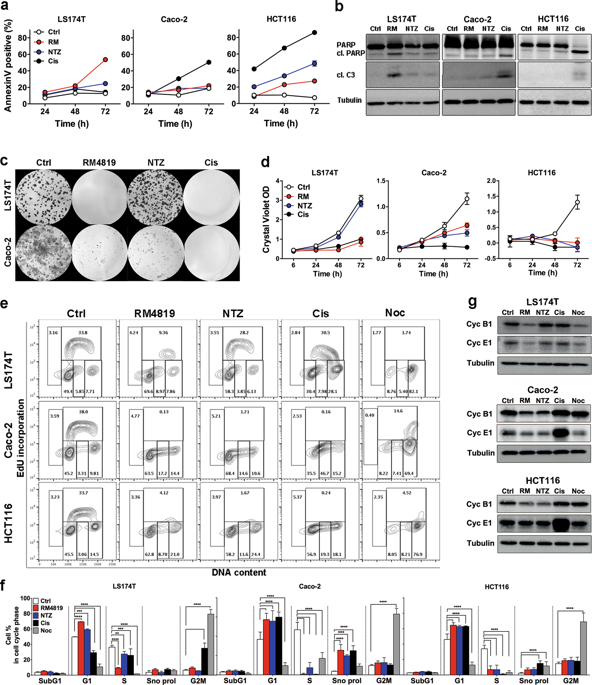Our official English website, www.x-mol.net, welcomes your feedback! (Note: you will need to create a separate account there.)
Thiazolides promote G1 cell cycle arrest in colorectal cancer cells by targeting the mitochondrial respiratory chain.
Oncogene ( IF 8 ) Pub Date : 2019-12-16 , DOI: 10.1038/s41388-019-1142-6 P Ripani 1, 2 , J Delp 2, 3 , K Bode 1 , M E Delgado 1 , L Dietrich 1 , V M Betzler 1, 4 , N Yan 5 , G von Scheven 6 , T U Mayer 2, 7 , M Leist 2, 3 , T Brunner 1, 2
Oncogene ( IF 8 ) Pub Date : 2019-12-16 , DOI: 10.1038/s41388-019-1142-6 P Ripani 1, 2 , J Delp 2, 3 , K Bode 1 , M E Delgado 1 , L Dietrich 1 , V M Betzler 1, 4 , N Yan 5 , G von Scheven 6 , T U Mayer 2, 7 , M Leist 2, 3 , T Brunner 1, 2
Affiliation

|
Systemic toxicity and tumor cell resistance still limit the efficacy of chemotherapy in colorectal cancer. Therefore, alternative treatments are desperately needed. The thiazolide Nitazoxanide (NTZ) is an FDA-approved drug for the treatment of parasite-mediated infectious diarrhea with a favorable safety profile. Interestingly, NTZ and the thiazolide RM4819-its bromo-derivative lacking antibiotic activity-are also promising candidates for cancer treatment. Yet the exact anticancer mechanism(s) of these compounds still remains unclear. In this study, we systematically investigated RM4819 and NTZ in 2D and 3D colorectal cancer culture systems. Both compounds strongly inhibited proliferation of colon carcinoma cell lines by promoting G1 phase cell cycle arrest. Thiazolide-induced cell cycle arrest was independent of the p53/p21 axis, but was mediated by inhibition of protein translation via the mTOR/c-Myc/p27 pathway, likely caused by inhibition of mitochondrial respiration. While both thiazolides demonstrated mitochondrial uncoupling activity, only RM4819 inhibited the mitochondrial respiratory chain complex III. Interestingly, thiazolides also potently inhibited the growth of murine colonic tumoroids in a comparable manner with cisplatin, while in contrast to cisplatin thiazolides did not affect the growth of primary intestinal organoids. Thus, thiazolides appear to have a tumor-selective antiproliferative activity, which offers new perspectives in the treatment of colorectal cancer.
中文翻译:

噻唑内酯通过靶向线粒体呼吸链来促进大肠癌细胞中的G1细胞周期停滞。
全身毒性和肿瘤细胞抵抗力仍然限制了化学疗法在大肠癌中的疗效。因此,迫切需要替代治疗。噻唑烷尼妥唑尼特(NTZ)是FDA批准的用于治疗寄生虫介导的传染性腹泻的药物,具有良好的安全性。有趣的是,NTZ和噻唑类内酯RM4819(其溴衍生物缺乏抗生素活性)也有望用于癌症治疗。然而,这些化合物的确切抗癌机制仍不清楚。在这项研究中,我们系统地研究了2D和3D大肠癌培养系统中的RM4819和NTZ。两种化合物均通过促进G1期细胞周期阻滞而强烈抑制结肠癌细胞系的增殖。噻唑化物诱导的细胞周期停滞与p53 / p21轴无关,但可能是通过抑制mTOR / c-Myc / p27途径介导的蛋白质翻译介导的,这可能是由于线粒体呼吸抑制所致。尽管两种噻唑类内酯均显示线粒体解偶联活性,但只有RM4819抑制线粒体呼吸链复合物III。有趣的是,噻唑类内酯还以与顺铂相当的方式有效地抑制了鼠结肠癌的生长,而与顺铂相比,噻唑类内酯并不影响原代肠类器官的生长。因此,噻唑类内酯似乎具有肿瘤选择性的抗增殖活性,这为大肠癌的治疗提供了新的见解。尽管两种噻唑类内酯均显示线粒体解偶联活性,但只有RM4819抑制线粒体呼吸链复合物III。有趣的是,噻唑类内酯还以与顺铂相当的方式有效地抑制了鼠结肠癌的生长,而与顺铂相比,噻唑类内酯并不影响原代肠类器官的生长。因此,噻唑类内酯似乎具有肿瘤选择性的抗增殖活性,这为大肠癌的治疗提供了新的见解。尽管两种噻唑类内酯均显示线粒体解偶联活性,但只有RM4819抑制线粒体呼吸链复合物III。有趣的是,噻唑类内酯还以与顺铂相当的方式有效地抑制了鼠结肠癌的生长,而与顺铂相比,噻唑类内酯并不影响原代肠类器官的生长。因此,噻唑类内酯似乎具有肿瘤选择性的抗增殖活性,这为大肠癌的治疗提供了新的见解。
更新日期:2019-12-17
中文翻译:

噻唑内酯通过靶向线粒体呼吸链来促进大肠癌细胞中的G1细胞周期停滞。
全身毒性和肿瘤细胞抵抗力仍然限制了化学疗法在大肠癌中的疗效。因此,迫切需要替代治疗。噻唑烷尼妥唑尼特(NTZ)是FDA批准的用于治疗寄生虫介导的传染性腹泻的药物,具有良好的安全性。有趣的是,NTZ和噻唑类内酯RM4819(其溴衍生物缺乏抗生素活性)也有望用于癌症治疗。然而,这些化合物的确切抗癌机制仍不清楚。在这项研究中,我们系统地研究了2D和3D大肠癌培养系统中的RM4819和NTZ。两种化合物均通过促进G1期细胞周期阻滞而强烈抑制结肠癌细胞系的增殖。噻唑化物诱导的细胞周期停滞与p53 / p21轴无关,但可能是通过抑制mTOR / c-Myc / p27途径介导的蛋白质翻译介导的,这可能是由于线粒体呼吸抑制所致。尽管两种噻唑类内酯均显示线粒体解偶联活性,但只有RM4819抑制线粒体呼吸链复合物III。有趣的是,噻唑类内酯还以与顺铂相当的方式有效地抑制了鼠结肠癌的生长,而与顺铂相比,噻唑类内酯并不影响原代肠类器官的生长。因此,噻唑类内酯似乎具有肿瘤选择性的抗增殖活性,这为大肠癌的治疗提供了新的见解。尽管两种噻唑类内酯均显示线粒体解偶联活性,但只有RM4819抑制线粒体呼吸链复合物III。有趣的是,噻唑类内酯还以与顺铂相当的方式有效地抑制了鼠结肠癌的生长,而与顺铂相比,噻唑类内酯并不影响原代肠类器官的生长。因此,噻唑类内酯似乎具有肿瘤选择性的抗增殖活性,这为大肠癌的治疗提供了新的见解。尽管两种噻唑类内酯均显示线粒体解偶联活性,但只有RM4819抑制线粒体呼吸链复合物III。有趣的是,噻唑类内酯还以与顺铂相当的方式有效地抑制了鼠结肠癌的生长,而与顺铂相比,噻唑类内酯并不影响原代肠类器官的生长。因此,噻唑类内酯似乎具有肿瘤选择性的抗增殖活性,这为大肠癌的治疗提供了新的见解。



























 京公网安备 11010802027423号
京公网安备 11010802027423号